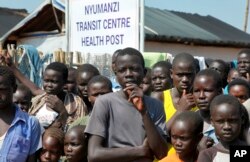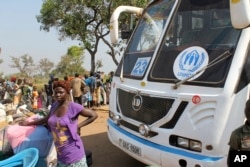Uganda is home to one million South Sudanese refugees. Aid agencies say the milestone number reached this week is a call to action for the international community to not only up donor support, but also renew efforts to end the conflict.
Exhausted families continue to arrive in Uganda this week as the total number of South Sudanese refugees in the country hit the one million mark. Armed rebels kept a close watch on the South Sudanese side of the border as the people cross.
The new arrivals braved heavy rains, cold nights and the scorching sun to find safety.
Once on the Ugandan side, Lacey Iya and her family stopped to rest.
She says they stayed for three weeks under trees with only saucepans, plates, and some cups for water. She says they need to be taken to a place to find peace, and leave what happened behind.
IN PICTURES: S. Sudanese Refugees Arrive in Uganda
South Sudan’s civil war began in December 2013, but aid agencies say there has been increasing violence a power-sharing deal fell apart in July of last year. Civilians have borne the brunt of the conflict.
According to the International Committee of the Red Cross, one in three of South Sudan's 12 million residents has been displaced, while one in two is severely hungry and in need of food assistance.”
'Wake-up call'
Amnesty International has called the one-million-mark a “wake-up call” for the international community, which it says must take measures to stop violence and other abuses against civilians in South Sudan.
The United Nations says since July 2016 Uganda has been receiving, on average, 1,800 South Sudanese refugees a day, 85 percent women and children.
UNHCR Uganda spokesperson Charlie Yaxley says a 14-year-old girl named Tabu Sunday is the symbolic one millionth South Sudanese refugee to arrive.
“She was forced to flee after armed groups attacked her village in the middle of the night. Together with her aunt she spent weeks travelling through the bush being forced to eat nothing but water lilies and drinking dirty water from dirty streams in order to arrive safely in Uganda.”
Three quarters of the South Sudanese refugees in Uganda have arrived in the past year, overwhelming the country’s resources, says the International Rescue Committee (IRC).
Fastest growing refugee crisis
IRC Country Director in Uganda Angela Rugambwa says it is the world’s fastest growing refugee crisis.
“There is not a slowdown in terms of refugees crossing over to Uganda. It has only been on the increase. And there has not been any corresponding means in terms of international aid that is coming in to cater for the one million South Sudanese refugees," she said.
Yaxley says of the $674 million needed for this year, UNHCR has received only 21 percent.
“Many refugees have seen their food rations cut in half. We see health clinics with insufficient doctors, drugs and health care workers. Let us be clear, this is a real children’s crisis. It is children that are being forced to flee through the bush often in the middle of the night for days, if not weeks on end, so there is a desperate need for a surge of solidarity with Uganda in order to ensure that these refugees are able to live in safety and in dignity.”
Yaxley says a resolution to the conflict in South Sudan appears nowhere in sight.
“So it is key that the international community comes forward to use the political influence they have over the leadership in South Sudan to bring the warring factions together to the table and dialogue so that we can bring an end to the bloodshed,” he said.
For now, all the one million South Sudanese refugees in Uganda can do is wait.








